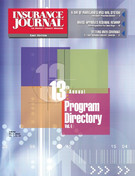Senate Panel Wants In, Agents Want Out of Brokerage Scandal
At recent Senate hearings in Washington called to follow-up on allegations of bid rigging and hidden compensation by Marsh and other large insurance brokers, public officials debated the politics of state versus federal insurance regulation, while agents, brokers and others in the industry tried to contain the damage brought about by the scandal.
The hearings included testimony from New York Attorney General Eliot Spitzer (D), whose charges against Marsh have ballooned into investigations into brokerage compensation and practices by state insurance regulators and attorneys general around the country.
Spitzer used the occasion to warn that more bad news for the industry is on the way, and to push for inquiries into other industry practices including the relations of some large brokers with offshore companies.
Retiring U.S. Senator Peter Fitzgerald (R-Ill.) chaired the hearing, which was titled, “Oversight Hearing on Insurance Brokerage Practices, Including Potential Conflicts of Interest and the Adequacy of the Current Regulatory Framework,” in his capacity as chairman of the Governmental Affairs Subcommittee on Financial Management, the Budget, and International Security.
Fitzgerald set the tone for the regulatory debate with his opening remarks in which he made clear that his mind is made up.
“My study of this insurance brokerage controversy convinces me that there is a federal role–the time honored federal role that guarantees competition and fights the mischief of undue market concentration,” Fitzgerald stated.
New York’s Spitzer agreed with Fitzgerald that a “hands-off” policy by the federal government in the area of insurance has not always worked and recommended several subjects the federal government might tackle.
Spitzer signaled that he believes investigations of the insurance industry have only “scratched the surface” thus far. He claimed that existing relationships between certain large insurance brokers and insurance companies amount to a “cartel based on hidden payments and preferential treatment.”
The New York official criticized the consolidation at the top of the insurance brokerage market, where he said Marsh and Aon together held 54 percent of the global brokerage market in 2002, with Willis holding an additional 7 percent. He said these same firms dominate reinsurance brokerage markets.
“With so much power concentrated in two or three brokerage firms, the threat of collusion has become a reality,” he said. “We found that a small group of brokers and insurance companies essentially control the market, having created a network of interlocking connections and secret payments which ensure that the bulk of business goes to certain insurers and that profits remain high. The bottom line is that the consumer pays more for coverage.”
Certain problems within the industry go beyond the reach of what one state can do and require federal intervention, according to the Empire State politician, pointing to the formation of offshore insurers as an example.
He claimed that some in the industry are using Bermuda, the Cayman Islands and other offshore havens to evade state regulation. “This makes the states’ job of supervising these companies far more difficult and creates numerous opportunities for secrecy and insider dealings,” he stated.
Large insurance brokers themselves have created several of the offshore entities, according to Spitzer. He pointed to Marsh’s involvement with Ace Ltd, XL Capital, Mid Ocean Re and Axis, and Aon’s sponsorship of LaSalle Re and Endurance.
“This sets the stage for conflicts of interest, steering and self-dealing in insurance and reinsurance markets that we are just beginning to understand. And this is not to mention the numerous and profound tax implications of U.S. insurers to accrue investment earnings in favorable offshore havens,” he told federal lawmakers.
He further maintained that insurers also coordinate pricing through rate service organizations and trade associations. Buyers do not know what percent of their premiums goes to pay claims and what goes to be invested, he argued. “With investments comprising the lion’s share of insurance company earnings, we need to ask ourselves to what extent are investment and interest rates driving premiums and what manner of disclosure is appropriate here,” Spitzer stated.
Not everyone agreed with Fitzgerald and Spitzer that federal involvement in insurance is warranted. Despite charging that too many state insurance regulators have become “industry captives,” Connecticut Attorney General Richard Blumenthal, who has been very active in investigating brokers in his state, rejected calls for federal intervention and instead urged more aggressive state action. He said states would block moves by federal authorities to intervene in their investigations.
“This state enforcement and reform effort cannot be derailed or delayed by federal intervention and intrusion. We have a right and responsibility to enforce state antitrust laws. We will seek strong sanctions and scrutiny. I say with great respect to the U.S. Congress, and particularly to the distinguished members of this panel: we fervently hope for cooperation and will fiercely fight preemption,” Blumenthal said.
He urged all states to be aggressive, warning that state “laxity and inaction” will invite federal intervention. “State insurance commissioners must heed the call for reform and act quickly to restore consumer confidence. Too many have been industry captives.”
N.Y.’s Serio: no headlines
Another speaker from New York urged lawmakers to look beyond media coverage in gauging the effectiveness of what states are doing. Speaking on behalf of the National Association of Insurance Commissioners (NAIC), N.Y. Superintendent of Insurance Greg Serio told the subcommittee that state regulators play a critical role in guaranteeing a fair and healthy insurance system even though what they do does not always garner the headlines that the attorneys general get.
“Due to the very serious consequences associated with charges of illegality and wrongdoing made by law enforcement officials–as well as the severity of potential penalties for persons and firms found guilty–the actions of attorneys general in states such as New York and Connecticut have attracted a great deal of media attention,” Serio noted in his testimony.
Meanwhile, he added, state insurance regulators are working jointly with state law enforcement investigations, sharing their expertise, developing the facts, and supervising the daily aspects of the insurance business–activities that do not get headlines, he commented.
“‘No news is good news’ for insurance regulators because it means the marketplace is functioning without significant problems and that our corrective efforts, when necessary, are working behind the scenes to keep insurance markets stable,” Serio maintained.
The nation’s largest independent insurance agency group used the Senate event to attempt to put some distance between large insurance brokers facing allegations of improper practices and local independent agents who have different responsibilities and compensation plans.
Alex Soto, a Miami, Fla., independent agent and officer of the Independent Insurance Agents and Brokers of America (IIABA), condemned bid rigging and other illegal and anti-competitive conduct and urged that any “bad actors” be fully prosecuted. At the same time, the IIABA representative spelled out the differences between agents and brokers.
He pointed out that most Americans deal with agents, not brokers. “The distinction between agents and brokers is important,” Soto emphasized, explaining that insurance agents typically do not get paid by the insurance purchaser, but receive compensation, usually a commission, from the insurer.
He noted that agents rarely receive compensation directly from consumers. On the other hand, he explained, an insurance broker offers advice directly to a client and solely represents that client and is more likely to be compensated directly by the client in the form of a fee. In some instances, the broker also receives commission from the carrier for placement of a policy, he pointed out. In addition, some agents and brokers may also qualify for incentive compensation from insurers when certain specified objectives are met, Soto explained. He defended these agreements as a legal and long-standing part of America’s sales culture.
“Sales incentive programs are a legal and legitimate tool used in nearly every industry to reward performance, including those that also rely on commission payments. From refrigerators to cars, and homes to business equipment, compensation that rewards a sales force for excellence is sound business practice. There is nothing inherently wrong with such payments that reward performance excellence,” he maintained.
Soto stressed that so-called placement service agreements (which were at the heart of some of the most serious market allegations) and contingent commission agreements are entirely different compensation tools but are unfortunately used in the media as if they are interchangeable.
“Put simply, PSAs compensate brokers up front for the placement of business, whereas contingent commissions are ‘contingent’ on a number of factors and paid on the back end,” he said.
He acknowledged concerns that incentive compensation can create a conflict of interest or the appearance of one because the broker is also paid a fee by the client and because of the broker’s unique relationship with the client. He said IIABA advocates transparency and “meaningful disclosure by brokers of all such agreements” but not their elimination.
An organization for some of the large commercial insurance brokers, The Council of Insurance Agents & Brokers, also showed up in Washington to defend the role of brokers and to dispel as “misguided” the presumption that brokers and insurance carriers must be in an adversarial relationship to best serve their customers.
In his testimony Albert R. Counselman, president and chief executive officer of Riggs, Counselman, Michaels & Downes in Baltimore, Md., said that a policy with the best price is not always the best protection.
“Over the course of the last several weeks, some have suggested that the broker’s job is to canvass every available product from each and every carrier to identify the ‘best’ carrier for that particular client and to then zealously represent the client in an adversarial negotiation process against that carrier,” Counselman said.
“The claim is that only through this adversarial process will the client receive the broadest coverage at the cheapest possible price from the ‘best’ carrier. In the real world, however, it is neither practical nor desirable to evaluate each and every carrier for each and every client.”
The least expensive coverage is not necessarily the best coverage, Counselman said, because in the end, insurance is fundamentally a promise between client and carrier to cover a risk exposure.
“A broker needs to be certain that the carrier has the capacity and financial solvency required to pay the claim in the event of a loss, as well as a reputation that suggests a willingness to make good on that promise,” he added.
Insurers were represented by Property Casualty Insurers Association of America President Ernie Csiszar, a former South Carolina insurance regulator, who urged Congress to carefully consider efforts that make insurance markets more competitive and transactions more transparent.
Csiszar maintained that the alleged illegal conduct is limited to a scant few in the industry and urged public policy makers to focus on identifying and prosecuting those who broke the law, while cautioning against painting the entire industry with the same brush.
“Individuals and companies that engage in illegal bid rigging and price manipulation should be prosecuted to the fullest extent of civil and criminal law,” Csiszar said. “But we reject the notion that incentive compensation creates a conflict of interest. On the contrary, it encourages agents and brokers to keep consumers in touch with the best service, risk management and pricing.”
Was this article valuable?
Here are more articles you may enjoy.


 Hackers Used AI to Breach 600 Firewalls in Weeks, Amazon Says
Hackers Used AI to Breach 600 Firewalls in Weeks, Amazon Says  Marsh Awarded Injunction Against Former Employees Now With Howden US
Marsh Awarded Injunction Against Former Employees Now With Howden US  Florida Appeals Court Pulls the Plug on Physician Dispensing in Workers’ Comp
Florida Appeals Court Pulls the Plug on Physician Dispensing in Workers’ Comp  Sompo Holdings Completes Acquisition of Aspen, Taking it Private
Sompo Holdings Completes Acquisition of Aspen, Taking it Private 


